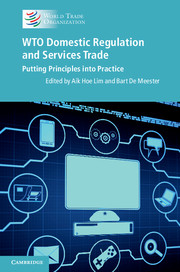Book contents
- Frontmatter
- Contents
- List of contributors
- Foreword
- Disclaimer
- Acknowledgements
- List of abbreviations
- 1 An introduction to domestic regulation and GATS
- Part I Impediments to services trade, regulatory theory and principles
- Part II Legal perspectives on WTO principles and domestic regulations
- 4 Reasonableness, impartiality and objectivity
- 5 Balancing legal certainty with regulatory flexibility
- 6 Who’s afraid of necessity? And why it matters?
- 7 Mutual recognition of services regulation at the WTO
- Part III Case studies
- Part IV Concluding remarks
- Index
- References
6 - Who’s afraid of necessity? And why it matters?
Published online by Cambridge University Press: 05 April 2014
- Frontmatter
- Contents
- List of contributors
- Foreword
- Disclaimer
- Acknowledgements
- List of abbreviations
- 1 An introduction to domestic regulation and GATS
- Part I Impediments to services trade, regulatory theory and principles
- Part II Legal perspectives on WTO principles and domestic regulations
- 4 Reasonableness, impartiality and objectivity
- 5 Balancing legal certainty with regulatory flexibility
- 6 Who’s afraid of necessity? And why it matters?
- 7 Mutual recognition of services regulation at the WTO
- Part III Case studies
- Part IV Concluding remarks
- Index
- References
Summary
Introduction
One of the most contentious issues of the Working Party on Domestic Regulation (WPDR) mandate has been the requirement that the new disciplines ensure that the covered measures do not constitute unnecessary barriers to services trade nor are more burdensome than necessary to ensure the quality of the service. This has been considered to encompass a so-called ‘necessity test’, similar to those included in other WTO agreements such as General Agreement on Tariffs and Trade (GATT) Article XX, Agreement on Technical Barriers to Trade (TBT Agreement) Article 2.2 or Agreement on the Application of Sanitary and Phytosanitary Measures (SPS Agreement) Article 5.6. World Trade Organization (WTO) members appear to be divided on this particular issue; and this is regardless of their level of development. This chapter intends to offer a succinct overview of the issues relating to the adoption of a necessity test. It will do so by first analysing the meaning of necessity as crystallized through WTO case law. Then, it demonstrates why the issue of necessity matters from a policy perspective and why it has had such a divisive impact.
Interpretation of the notion of necessity in other WTO agreements
Since the inception of GATT, necessity tests have formed part of the contract, providing flexibility and ‘breathing space’ to regulators. Necessity has been traditionally considered as the prevailing proxy for the identification and the discipline of protectionist or unduly burdensome regulatory behaviour. It is through the application of a necessity test that the GATT/WTO adjudicating bodies have attempted to draw the dividing line among competing values – those of promoting trade and the pursuit of legitimate policy objectives. Necessity typically forms part of a WTO provision that encompasses a positive obligation or an exception which can be raised as an affirmative defence to justify derogation from the WTO obligations. In the first case, necessity is typically accompanied by an open-ended list of public policy objectives. Examples include TBT Agreement Article 2.2 or SPS Agreement Article 5.6. In the second case, the provision entailing an exception includes a closed list of objectives to narrow down the possibility of deviating from a given WTO obligation. This, however, does not mean that such exceptions will be construed narrowly. Probably the opposite is true, if one considers cases such as the United States – Shrimp or United States – Gambling.
- Type
- Chapter
- Information
- WTO Domestic Regulation and Services TradePutting Principles into Practice, pp. 95 - 109Publisher: Cambridge University PressPrint publication year: 2014
References
- 2
- Cited by



